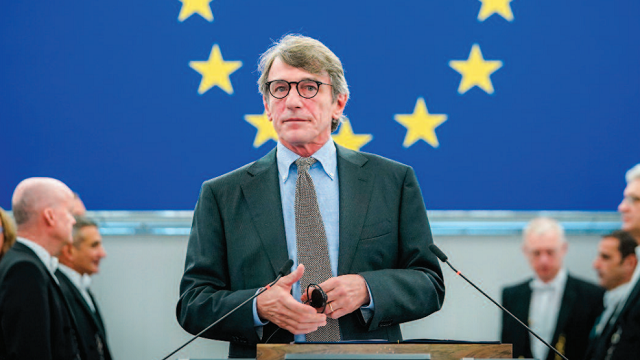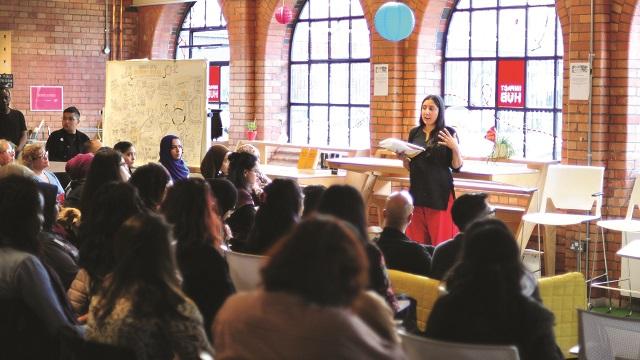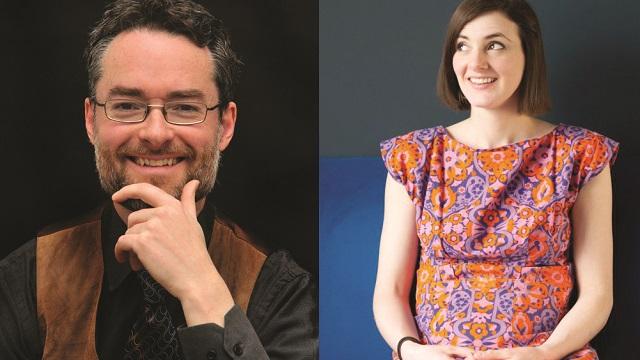-
QUALIFICATIONS
- For Linguists Worldwide
- For UK Public Services
- Preparation
- Policies & Regulation
-
MEMBERSHIP
- Join CIOL
- Professional Membership
- Affiliate Membership
- Chartered Linguist
- Already a member?
- Professional conduct
- Business & Corporate Partners
-
LANGUAGE ASSESSMENTS
- English
- All Other Languages
-
CPD & EVENTS
- Webinars & Events
- CIOL Conferences
- Networks
- CIOL Mentoring
-
NEWS & VOICES
- News & Voices
- CIOL eNews
- CIOL Awards
- The Linguist Magazine
- Jobs & Ads
-
RESOURCES
- For Translators & Interpreters
- For Universities & Students
- Standards & Norms
- CIOL & AI
- All Party Parliamentary Group
- In the UK
- UK Public Services
- Find-a-Linguist
Wikipedia: Editing the narrative
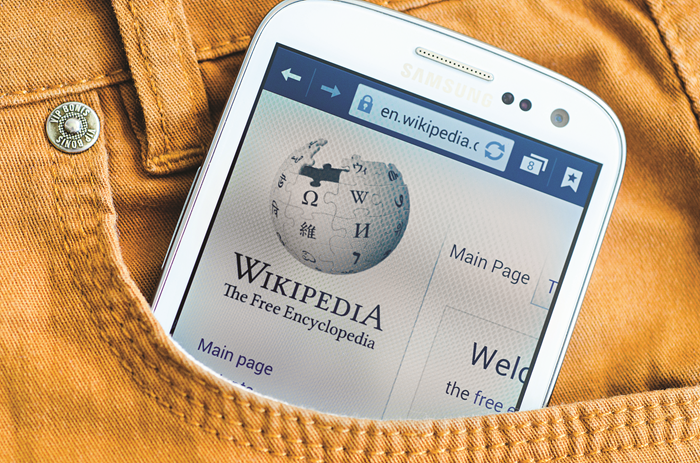
Why each language version tells a different story, and the power dynamics behind the platform. By Guilherme Fians
Few would disagree that the airplane is one of the great marvels of modern engineering – and we could confidently call that a consensus. But consult Wikipedia about who invented it and the answer depends on the language you read. On the English-language Wikipedia, the Wright brothers reign supreme in the article titled ‘Airplane’. On Wikipedia in French, the article ‘Avion’ celebrates Clément Ader as the pioneer responsible for inventing the airplane and coining the term ‘aviation’. In Portuguese, the ‘Avião’ page cites the Wright brothers but gives prominence to Alberto Santos Dumont, who made the first self-propelled flight without the assistance of a catapult.
According to Wikipedia, it seems, the airplane has multiple inventors, each neatly aligned with linguistic boundaries. What began to me – a digital anthropologist interested in sociolinguistics – as a search for information quickly became a journey around one invention loaded with many origin stories. So, who is right? The short answer: it depends on the language you speak – and the Wikipedia you are reading.
Crowd-sourced or chaotic?
Labelled “the free encyclopedia that anyone can edit” and available in over 340 languages, Wikipedia is intended to produce a “summary of all human knowledge”. But behind this noble mission lies a messy, multilingual reality. After all, the internet – and knowledge production, for that matter – is not as English-centred as algorithms and social media might lead us to believe.
By inviting ‘anyone’ to edit its content, Wikipedia’s founders and editors seek to democratise knowledge, which sets this online platform apart from less accessible sources of information like expensive learning materials and news websites behind paywalls. This DIY, user-centred functioning leads to fascinating variations in how historical and scientific facts are narrated. And the multiple language versions of Wikipedia inevitably add curious pieces to this intricate puzzle. This gives us clues about why the airplane has different inventors on different Wikipedias. But what does it tell us about who can produce knowledge online? Ultimately, what is the role of translation in this multilingual platform?
What I found in my ethnographic research on multilingual spaces online is that digital media labelled ‘global’ cannot be understood by exclusively analysing the English versions.1 This leads to a crucial reminder: an attention to language and translation – or lack thereof – can change how we perceive the internet.
Multilingual selective storytelling
Many English speakers might assume that the Wikipedia page on the airplane in French is simply a translation of the English one. Not really. While Wikipedia editors may take inspiration from other language versions, each version works semi-independently, and volunteer editors often draft articles from scratch. This is where things get interesting: since Wikipedia content must be supported by reliable sources, editors understandably draw on references in the languages they know best. Sources, in turn, reflect the curricula of countries where the language is spoken, popular historical narratives and even geopolitical sensitivities.
Take, for example, the phrase ‘attempted to fly’ to describe Clément Ader’s 1890 flight. While technically accurate, this expression appears diplomatically dismissive. The French version, instead, honours Ader’s coining of the word ‘aviation’ as a semantic achievement in itself, and acknowledges his flying machines as early aviation milestones, whether or not they meet modern definitions of ‘controlled flight’.
While the English article endorses the Wright brothers with several bibliographical references, the French article supports Ader’s pioneering contributions with sources exclusively in French – perhaps the only language in which he is systematically recognised as a key figure in this story. In Portuguese, the references that most prominently celebrate Santos Dumont’s near-mythical status are, unsurprisingly, in Portuguese. What does this tell us?
First, there might be an element of selective storytelling that privileges a historical narrative in line with readers’ expectations. Since most readers and editors of the French-language Wikipedia are based in France, a story that celebrates a French pioneer suits this readership well, and the same could be said about Brazilian readers who feel represented with Santos Dumont rising to glory in the history of aviation.
Second, while different speech communities might highlight different protagonists based on national pride or on what they learnt at school, these competing historical narratives also stem from the availability of sources in that language. This uncovers a matter of missing translation: hardly any Brazilian, Portuguese or Mozambican book about aviation would mention Clément Ader – and what does not get translated is just as important as what does.
Who gets to write history?
Wikipedia is among the most multilingual platforms on the internet. However, being multilingual does not mean being equitable. Many of Wikipedia’s templates, plug-ins and editing tools are only available in English, and largely draw on English-language
coding conventions. In other words, while anyone can edit, those who are fluent in English often find it easier to participate in this space. This sets up a subtle but significant form of gatekeeping. If you are not confident with the platform’s English-centred backend, your contributions might be limited or never be made at all – which is a real problem for a platform entirely based on user-generated content.
What is at stake, then, is who gets to write history and produce knowledge. In many countries, Wikipedia is among the most accessible sources of information available and a first stop for students, journalists and curious minds. But if its articles differ drastically by language – whether in tone, emphasis or even fundamental ‘truths’ – we are faced with the question: whose knowledge are we accessing?
The airplane is not the only example of this phenomenon. Another fascinating case is Wikipedia’s coverage of the 1982 Falklands/Malvinas War. While the article in English refers to an ‘Argentine invasion’, the Spanish page speaks of a ‘British occupation’.2
A similar pattern emerges in articles about Vladimir Putin. Wikipedia in Ukrainian devotes two of its four introductory paragraphs to detailing how Putin has been condemned and sanctioned by the UN, the US and the International Criminal Court. The article in Russian, by contrast, mentions these sanctions and arrest warrants in only one of six introductory paragraphs, subsequently focusing largely on his political achievements. Meanwhile, the English page has long been under extended confirmed protection, a response to the heated ‘edit wars’ that broke out after Russia’s invasion of Ukraine in 2022.3
These contrasting accounts are not just a semantic matter; they reveal deep geopolitical and ideological divides that carry over into editorial decisions. And this pattern repeats across topics, from science and history to pop culture, which hints at how the national origins of editors and the availability of sources in certain languages help shape knowledge on digital media.
Multiple inventions, multiple wars
Disagreements between Wikipedia editors – which can be observed by peeking into the ‘Talk’ and ‘View history’ metapages accompanying each article – are not just about facts, but about the kind of story each editor wants to tell. In a world where disinformation spreads fast and where tech companies increasingly use AI to translate content automatically, understanding the limits of language – and of translation – becomes key.
Wikipedia shows that every verifiable historical fact is a mosaic of situated knowledges and linguistic power dynamics. While this can be frustrating for those seeking ‘the one right answer’, it is also what makes Wikipedia remarkable: it is an archive of human perspectives permanently under construction – and, almost certainly, already different from the moment this article was written. So next time you search for who invented the airplane or who won a war, consider reading these articles in another language. You might find a different hero. And you will definitely find a different story.
Notes
1 Fians, G (2024) ‘After All, Who Invented the Airplane? Multilingualism and the grassroots production of historical knowledge on Wikipedia’. In Language and Communication 99, 39-51
2 Góngora-Goloubintseff, JG (2020) ‘The Falklands/Malvinas War Taken to the Wikipedia Realm: A multimodal discourse analysis of cross-lingual violations of the Neutral Point of View’. In Palgrave Communications 59 (6), 1-9
3 Fians, G (2024) ‘Liberdade na enciclopédia livre: Entre culturas colaborativas e participação tecnoliberal na Wikipedia’. In Horizontes Antropológicos 30 (68), 1-31
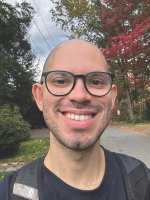
Dr Guilherme Fians is a digital anthropologist working at the University of Manchester. His research on multilingual knowledge production, authority, authorship and language activism has appeared in English, Esperanto, French and Portuguese. His latest book is Esperanto Revolutionaries and Geeks (Palgrave Macmillan, 2021).
This article is reproduced from the Autumn 2025 issue of The Linguist. Download the full edition here.
More
The Chartered Institute of Linguists (CIOL), Incorporated by Royal Charter, Registered in England and Wales Number RC 000808 and the IoL Educational Trust (IoLET), trading as CIOL Qualifications, Company limited by Guarantee, Registered in England and Wales Number 04297497 and Registered Charity Number 1090263. CIOL is a not-for-profit organisation.


